We may earn commissions when you buy from links on our site. Why you can trust us.
Gadgets that Help You Save Energy
 Getting a handle on your household energy consumption can save money and the environment. Your heating and cooling usage is an obvious target, but did you know it's also important to monitor your gadgets and electronics gear?
Getting a handle on your household energy consumption can save money and the environment. Your heating and cooling usage is an obvious target, but did you know it's also important to monitor your gadgets and electronics gear?
The average US household spends $100 per year powering products that are turned off or in standby mode, according the the EPA. And, nationwide we spend $10 billion a year in energy costs.
Below you'll find devices that help determine where you're losing your money and ensure you keep spending under control.
Saving money on heating & cooling
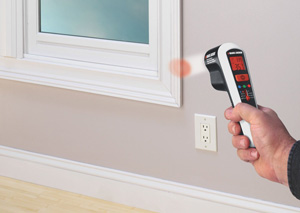 Black & Decker TLD100 Thermal Leak Detector
Black & Decker TLD100 Thermal Leak Detector
You'll see big savings on your monthly energy bill when you stop heat and air conditioning from leaking out of your house. A thermal leak detector, like the Black& Decker TLD100 can show you where your home's leaks are. Once the device has read the ambient temperature, you can start checking around windows, door frames and other places air could be escaping. The light will change to red for warmer spots and blue for cooler spots. You can set the temperature tolerances to one, five or 10 degrees.
Price: $33.21 on Amazon.com
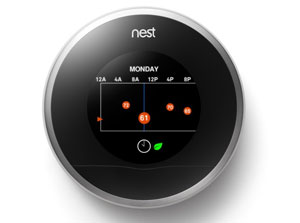 Nest Learning Thermostat
Nest Learning Thermostat
The Nest Thermostat (2nd Generation) is smart enough to know when you're away. So if you forget, it can lower the temperature about two hours after you've left. It's continually monitoring your habits, so it can automatically adjust the temperature based on your needs. And, Nest lets you know when you're saving energy, rewarding you with a green leaf icon. Even small changes to your thermostat settings can impact your monthly energy bill. For instance, each degree above 68° F can add three percent to the amount of energy needed for heating, according to the Edison Electric Institute.
Price: $249.00 on Amazon.com
Reducing energy use
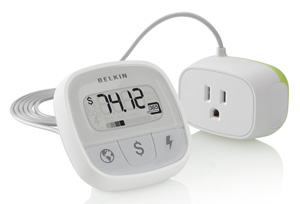 Belkin Conserve Insight Energy-Use Monitor
Belkin Conserve Insight Energy-Use Monitor
Want to find out which electronics items are the biggest energy hogs in your home? Plug suspects like your networked printer, TV or even a whole powerstrip into the Belkin Conserve Insight Energy-Use Monitor to find out. It tracks and displays the annual cost (based on the pre-loaded U.S.-average rate or your own rate), CO2 emissions and power consumption. And if the outlet is hard to reach, the display's six-foot cord make it easy to put it in a place that’s convenient to read.
Price: $99.00 on Amazon.com
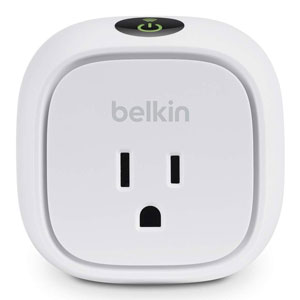 Belkin WeMo Insight Switch
Belkin WeMo Insight Switch
Curling irons, space heaters, coffee makers: they're all easy to accidentally leave on when you're rushing out the door. So to ensure they're turned off, you can plug them into a Belkin WeMo Insight Switch. Remotely check in on an appliance or electronic device and turn it off (or on), set a schedule and monitor and control energy usage. If your device is on a switch, like your lights, try the WeMo Light Switch. It works with your existing wall plates.
Price: Belkin WeMo Insight Switch: $50.99 on Amazon.com, Belkin WeMo Light Switch: $43.99 on Amazon.com
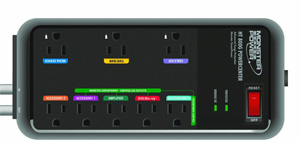 Monster MP HT 800G Home Theater PowerCenter
Monster MP HT 800G Home Theater PowerCenter
When you're TV is off, you don't need your DVD player, surround receiver or game system turned on. With The Monster MP HT 800 G Home Theater PowerCenter with Monster GreenPower, you plug your TV into the green master plug on the lower right, and the outlets on the same row to the left, the GreenPower outlets, shut down automatically when the TV is turned off. The three outlets on the top row stay on, so you can continue to record programs on your DVR. In case of a power surge, you'll get 2160 Joules of protection and an alarm will sound. If your powerstrip is buried at the back of your entertainment center, try the Belkin Conserve Switch Energy-Saving Surge Protector. It comes with a wireless remote for turning off power.
Price: Monster MP HT 800G: $46.63 on Amazon.com, Belkin Conserve Switch Energy-Saving Surge Protector: $34.42 on Amazon.com.
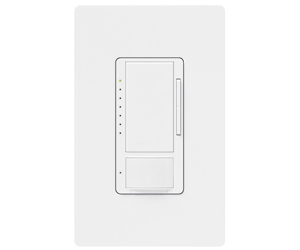 Lutron Maestro Dimmer with Occupancy Sensor
Lutron Maestro Dimmer with Occupancy Sensor
Have a light someone's always forgetting to turn off? Install a motion-sensing light switch that will automatically shut off when the room is empty, like the Lutron Maestro Dimmer with Occupancy Sensor. It has a 150 degree motion detector with an angle up to 30 feet. You can set the sensitivity and the time or operate it manually. The light will go back on at whatever dimming level you set it at last. For use with incandescent and dimmable compact fluorescent bulbs.
Price: $37.65 on Amazon.com
["Go Green" keyboard via Shutterstock]
Updated on 1/23/2015
Discussion 
If the energy monitoring devices mentioned do what they claim and do it efficiently, I’m on board. Few of us have the time to monitor energy consumption let alone our schedules. We already know what the responsible thing is. These gadgets seem like a saavy way to help us save some energyat the same time.
one item on your list of energy saving products if it does work I believe it will be well worth the money. I have 11 different products in my office alone, that stays on mostly on standby, so I probably will be buying it soon.
In Victoria (Aus) our government has an incentive at the moment. If you call 1300 725 652 or visit www.nuestandby.com.au they arrange a time and come out and install Standby Controllers free. (3 free) They automatically turn everything off (including anything on standby) after either 1,2 or 3hrs, you programme that yourself. Once you turn off your main appliance ie: T.V. it will automatically shut all others down completly. If you have cable or satellite T.V. they make sure that is not connected, so you don’t miss shows and updates. Great idea.
Cable boxes, stereos, dvd players, etc are some of the worst offenders when it comes to “standby power”... Standby power is the small amount of power still used by electronics even when they are switched off. The products mentioned in the article are great for putting an end to that. There are also a lot of power strip / surge protectors available now that have this technology built-in or have a remote control that lets you cut power to everything with one click.
My home theater has programming so it’a staying on
standby so I don’t have to reprogram it every time. As far as I know there is no way around the cable box, but I was unaware that cell phone chargers draw
juice even when not in use. I have 3 that are always plugged in. NO MO Thanks for the tips
If I could request a new product along this line, I’d love to see a multi-outlet plug in line with the the Belkin WeMo or Conserve, but with several outlets. These solutions are too expensive for me to justify buying one for each outlet, and a powerstrip seems silly in the bathroom or kitchen where I’d have multiple devices (2 electronic toothbrushes, Mia brush, curling iron, etc. or coffee pot, blender, toaster oven, etc.). Why haven’t they come out with a six outlet plug and put a switch on the side? I’d buy three of these for our house today.
As an aside, we’ve used the Monster power strip as referenced in this article for well over a year now and love it. The cable box has to be always on to record shows, but when the receiver is turned off, the TV, DVD, Wii, and headphones all go off as well.
Clustering devices in one outlet & shutting them off at one time makes sense to me. I hope Belkin or Monster comes out with a sleek & efficient way to do this in my bedroom, bathroom and kitchen as well.
I’d like to see information in the article on how long it takes the average user to recoup their investment on these devices. Just want to be an informed consumer.
Also, I have found the GFI outlets that are code in most bathrooms to be problematic when plugging in certain devices.
It’s not easy to provide “averages” because there are so many variables that go into the calculation:
- What is the average energy cost in your area?
- How leaky is your house?
- How cold/hot does it get where you live?
- What devices do you use and how efficient are they?
That’s where products like the Belkin Conserve Insight Energy-Use Monitor above come in handy. You can measure specific devices to determine which are the biggest energy wasters. Similarly, the Black & Decker Thermal Leak Detector will give you a sense of whether spending money to further insulate your house will be worth the cost. Since both are around $30, it’s a small upfront investment to make.
I installed the Lutron Maestro dimmer in our bathroom because I was sick of the kids constantly leaving the lights on. Does it save enough energy to pay for itself? Probably not. Does it save my sanity? yes.














From James Mejuto on April 16, 2012 :: 10:50 am
My electric bill is very high considering that I live alone here in Florida in a modest house. I feel that I can cut this monthly cost and I’ve tried everything. Can you answer these questions?:
Do room lamps that remain plugged in, consume energy when they are not on? ... and should I unplug all the lamps, when I don’t use them ?
Does my plugged-in TV consume energy when its turned off? . . . if so, should I unplug it from the wall?
Reply
From Donna on April 16, 2012 :: 11:22 am
Regular room lamps supply no energy until turned on. What you may want to be on top of are any cell phone, tablet, computer chargers that are plugged in and not connected to the devices themselves. They take alot of energy just sitting waiting to be adapted to their mate. As for the TV, if it is an older one, I would say it’s the same as the lamps. The newer TV’s I am not so sure as some do connect to the web and could be constantly roaming for signals.
Reply
From Rich Moser on April 16, 2012 :: 12:50 pm
Lamps do not “draw” power when turned off, but televisions do. Also stereos, computers (I think), many items that are high tech, you’d have to unplug them. You might learn about the Energy Star ratings to help you choose appliances in the future. New refrigerators are much more efficient than old ones too.
Reply
From Suzanne Kantra on April 16, 2012 :: 10:43 pm
There’s no need to unplug anything. you can buy a power strip that comes with a remote control to turn power on and off, like the Belkin Conserve Switch ($39.99). Or for single outlets, there’s the Belkin Conserve Power Switch ($6.99).
Reply
From Jo on April 18, 2012 :: 10:52 am
Hope I don’t sound too dumb, but when turning off power to electronics & appliances that have digital clocks on them, doesn’t that mean you would have to reset every time you power them on again? Also cutting power to cable box means I would have to wait for it to reconnect each time. Is there any way around that?
Reply
From Suzanne Kantra on April 18, 2012 :: 3:27 pm
If the device connects to the Internet, it may reset the clock automatically. If not, you’ll want to keep that electronic device plugged in. As for the cable box, there’s no way around waiting for it to boot.
From Tracy on June 11, 2012 :: 2:09 am
Or just add a light switch to the outlet
Reply